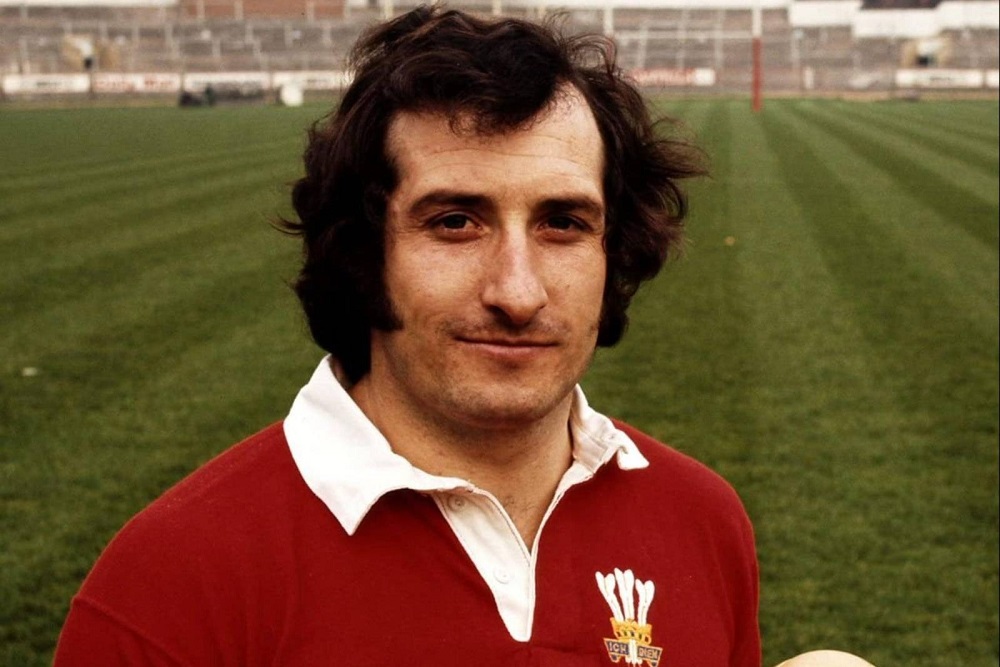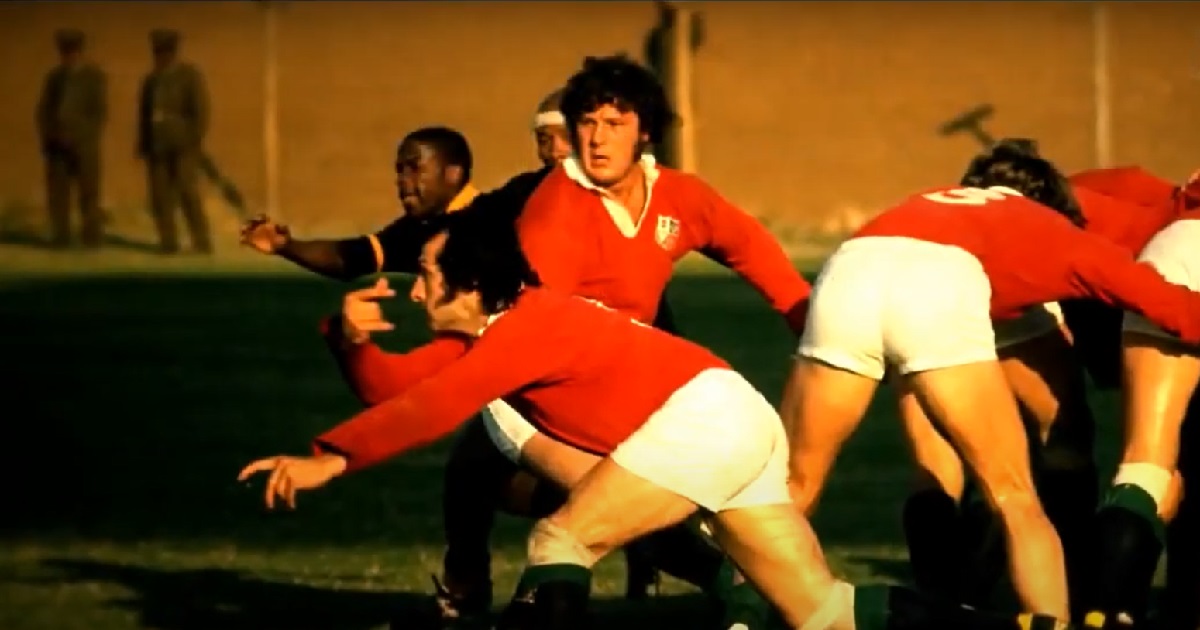Wales legend Gareth Edwards recalls South Africa exploits

Simon Thomas
For Sir Gareth Edwards, seeing Wales’ four regions out in South Africa has brought back memories of his own playing days in the country – and he has some pretty special ones.
The scrum-half legend went on two British & Irish Lions tours to the home of the Springboks, played for a World XV out there and also visited with his club Cardiff.
It was the Lions trip of 1974 that was the real high point, as Willie John McBride’s side went through the tour undefeated, with Edwards playing a key part in a 3-0 series triumph over the ‘Boks. The great man from Gwaun-Cae-Gurwen was at the peak of his powers on that African adventure.
But it was much earlier in his career that he made his first journey to the country. That was in May 1967, on a club tour from the Arms Park, when he was a fresh-faced 19-year-old in his first season of senior rugby.
Watching Cardiff record a stunning 35-0 URC victory over the Sharks in Durban last weekend brought back happy memories of that teenage trip of his.
“That was probably the best performance by a Cardiff team in South Africa since we beat Eastern Province 34-9 in Port Elizabeth back in 1967,” he said. “I played full-back that day. Billy Hullin was at scrum-half.”
Edwards contributed a try and a drop goal from his unfamiliar position, while winger Maurice Richards racked up 19 points, made up of three tries and five conversions.
“Eastern Province had beaten France not long before and had defeated the Lions on a number of occasions, so it was a big win for us. We were brilliant, dare I say it!,” he said.
Lions tour
The following year, now firmly established at No 9 in the Wales team, Edwards went on the 1968 Lions tour of South Africa. That was to be his first experience of playing at altitude, with his two outings for Cardiff having been down at sea level.
Explaining what it’s like running out on the High Veldt, he says: “You can hardly breathe. It’s lack of oxygen, as such. It’s like chalk and cheese to playing down in Cape Town or Durban. There a huge difference between playing at sea level and playing at altitude.
“It’s not only a physical thing you’ve got to overcome. It’s how far the ball travels as well. It’s a lot more difficult to gauge when it goes up in the air.
“When you kick a ball at sea level, you sort of expect it to travel about 50 yards or something like that, especially the modern balls now. But at altitude, the bloody thing goes forever.
“I remember Keith Jarrett coming out on the ‘68 Lions tour and joining us in Johannesburg before we played Transvaal.
“For a bit of fun, he put the ball down on the 22 and kicked a few goals. Then he went back to the 10 yard line and kicked a few more, then half-way, then our ten yard line. Then he went back to our own 22 yard line and bloody kicked it over from there! That was with the old leather balls, as well. It was just incredible to witness how far the ball went.”

Edwards started two of the four Tests on that tour, including the drawn game in Port Elizabeth which was to be the Lions’ best result, with the Springboks winning the series 3-0.
“We weren’t good enough, to be perfectly honest. South Africa were better than us at the time. They had some exceptional players like Frik du Preez, Piet Greyling and Dawie de Villiers, their scrum-half and captain, who was fantastic. We didn’t quite have the fire power.
“But it was a great learning curve and we had a wonderful spirit on that tour which I believe was a contributory factor to the success of years to come.”
Those successes were to be bountiful with Edwards starring in the Lions’ 1971 series victory over the All Blacks, still their only triumph in New Zealand, and then, three years later, coming out on top again in South Africa.
That 1974 trip held an added resonance for him as his wife Maureen had just given birth to their first child, son Owen. She was still in hospital when he headed off to spend 11 weeks out in South Africa, which he admits was very difficult.
Then, just before the series opener against the Springboks in Cape Town came a moment he will always remember. His boss had travelled out for the match and brought with him a special delivery from Maureen.
“We were on the bus journey from the centre of Cape Town to Newlands for the first Test and I had this letter. I opened it and inside was a polaroid photo of Owen. I kissed it and said ‘This one is for you’. It was an incredible feeling.”
He proceeded to do baby Owen proud, as he landed a drop goal from near half-way to seal a 12-3 victory as the Lions went 1-0 up.
“In the week leading up to the match, it had been pretty wet. It was more British weather and what we were used to from back home. Having such a good set of forwards, we were able to control the game in those conditions. I think that’s where South Africa were really surprised. They had a very strong pack, but our forwards measured up to it,” said Edwards, who turned 75 earlier this year.
“With the drop goal, an opportunity came my way and I just hit it. I was surprised how far it travelled because the conditions were pretty deplorable, but sometimes you just strike the ball sweetly. It just sailed between the posts and gave us enough of a lead to be comfortable in the end.
“It was such a shock for the Springboks to be beaten. They hadn’t lost a first Test at Newlands since 1938. They ended up being sent to jail as a result!
“They went to Pretoria prison to prepare and train, to get out of the limelight, away from all the press and all the attention, so they wouldn’t be reading negative things.
“They were hidden away from everything, away from all the paraphernalia and from what was happening. They weren’t aware of anything that was going on, just concentrating on the rugby.”
Intimidating
Then came the day of the second Test at Pretoria’s Loftus Versfeld, traditionally one of the most intimidating grounds in the country.
“Going to Loftus is tricky at the best of times. Now it was going to be their wagon trains all circled and ready for us. They really thought this was going to be their resistance, on the High Veldt, playing at altitude on hard ground,” said Edwards.
“They brought in all this scaffolding to erect temporary stands, taking the capacity up from 30,000 to 60,000. It was all set. They were really looking forward to this. It was going to be their pay-back to us. The Springboks had been locked away, preparing for this. It was serious business.
“Anyway, by coincidence, they happened to arrive at Loftus just minutes before our bus was coming down the road. Now I became very friendly with their great No 8 Morne du Plessis over the years and I will always remember him telling me about it.
“He said the Lions bus came in through the gates and all the Springboks players could hear was this singing coming out of the bus, ‘Oh Flower of Scotland’. The noise was vibrating all around the place.
“He told me ‘We had been hidden away from everything and then, all of a sudden, here were you guys coming in full of the joys of spring, singing songs’. He said it had a huge effect on them.”
Buoyant
The buoyant Lions went on to win the game 28-9, proving they could do the business on both hard and soft tracks, with wing JJ Williams touching down twice and fly-half Phil Bennett scoring a dazzling solo try. It was the heaviest defeat in Springbok history up to that point.
“We played some fantastic rugby that day. It was quite an outstanding experience to win so comprehensively up on the High Veldt,” said Edwards.
“We all played well, but Phil was superb. They had no answer when he got hold of the ball. He scurried, he side-stepped, he did this and he did that. I knew the hard grounds would suit him out there, but he was just devastating, quite sensational. He was virtually unplayable on that tour.”
The Lions sealed the series by winning the third Test 26-9 in Port Elizabeth, a match which has since been dubbed the ‘Battle of Boet Erasmus’ due to the outbreaks of violence, but which also saw some thrilling rugby from the men in strawberry red. There were two more tries for flying wing JJ Williams, while great Scottish second row Gordon Brown also went over after Edwards burst down the touchline and gave the inside scoring pass.
The final Test at Ellis Park, Johannesburg, ended in a 13-13 draw with the tourists denied a 100 per cent record as Irish flanker Fergus Slattery controversially had a try ruled out.
“We would have loved to have won every match, but it wasn’t to be. The Test series was won and we were still unbeaten in South Africa.”
Indeed, looking back, what the Class of ‘74 achieved, going through the entire 22-match trip without losing a game, gets more remarkable with each passing year.
“The side was full of great individuals and experienced players. We had the forwards and we had the backs who were in good form. We played some outstanding rugby and we just nailed it,” says Edwards, who was joined in the Test team by countrymen
JPR Willliams, Mervyn Davies and Bobby Windsor, along with JJ and Bennett.
In 1977, he returned to South Africa to play for a World XV against the Springboks in a match to mark the opening of a new stand at Pretoria’s Loftus Versfeld.
It was some team he was part of, with the likes of McBride, JPR, Ian Kirkpatrick, Jean-Pierre Rives, Gerald Davies, Andy Haden and Hugo Porta alongside him.
The following year, Edwards hung up his boots at the end of a glittering career, one in which some of his most memorable moments came in the land now known as the Rainbow Nation.
Support our Nation today
For the price of a cup of coffee a month you can help us create an independent, not-for-profit, national news service for the people of Wales, by the people of Wales.





All those British teams playing rugby in violently racist apartheid South Africa was utterly shameful and the rugby community’s constant celebration of these events should be a source of embarrassment.
I think this article lacks any context. To write an entire piece about a Welsh player’s happy memories of playing in South Africa without reference to the fact that they were playing against teams from which black people were excluded seems utterly bizarre. Has the writer no knowledge of the mighty anti apartheid struggle that was going on within South Africa and outside it? And did he not think to question how Gareth Edwards feels now about having played against white only teams? How did anyone think it was a good idea to publish this?